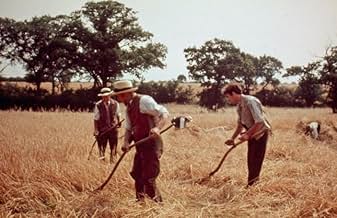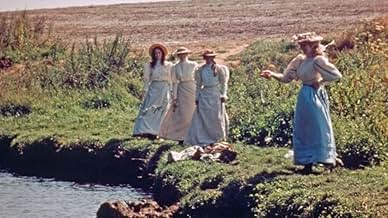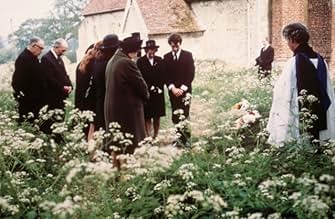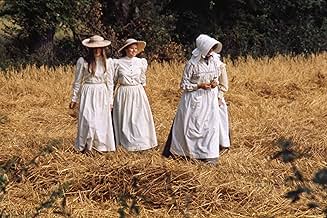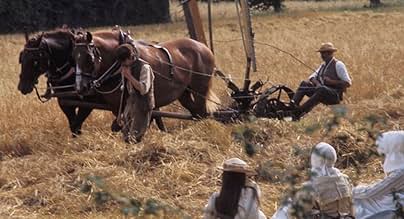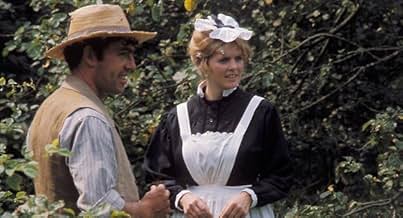As the young man, Tom, prepares to leave the Suffolk village of his birth, voices and experiences from his family's past crowd in on his mind, weaving a poetic tapestry of the love of home a... Read allAs the young man, Tom, prepares to leave the Suffolk village of his birth, voices and experiences from his family's past crowd in on his mind, weaving a poetic tapestry of the love of home and the longing to get away from it.As the young man, Tom, prepares to leave the Suffolk village of his birth, voices and experiences from his family's past crowd in on his mind, weaving a poetic tapestry of the love of home and the longing to get away from it.
- Director
- Writer
- All cast & crew
- Production, box office & more at IMDbPro
Featured reviews
The film stuck to what it was like. There was no acting then, or in this film, just people saying things through the day, and always trying to settle or resolve all troubles with proverbs and sayings and mottoes. A closed world, really. The leaving was so difficult and so simple, so treacherous --- how dare you? Not like other films, but the story deserved to be told, and told just like this is. I'd like to thjank Peter Hall for making this film.
It tells of the first Tom's life working on a farm and living in a tied cottage – always dreaming of owning his own land and being too over worked and poor to ever countenance such dreams to the waking hours. It tells of the love that draws him to home and the burning desire to get away as they co-mingle in his heart and mind.
This is done like a pastoral poem in places with the musical score perfectly balanced to capture the on screen mood and chemistry. It is part history, social commentary and part melancholy in its approach to a bucolic past that some would now miss and others are glad to be rid of. This is a film for those who take cinema seriously and love our shared history on film.
I'm afraid that I was not impressed.
Pretty pictures and an "arty" film, but nothing much happens in any sort of way for the full the full length of the film and you are left coming out thinking "what was that all about?".
If you like pictures of rural scenery and are put off by action or complicated plot you will love this film.
A film to take you back in time...
Based on Ronald Blythe's 1969 book of the same name, Peter Hall (the famous theatre director) was brought on board to adapt it for the screen. It follows the story of Tom, a farmer seeking to escape the suffocating traditions and ways of country life. His tale is intercut with those of both his father and grandfather, revealing just how little has changed in the village in almost a century. A portrait of a rural English village over the changing eras and seasons, the film was shot entirely in the real Akenfield. The shoot lasted one year, with work only undertaken on weekends.
Seeking the authenticity of rural life, Hall made his cast up of local people from Akenfield and the surrounding villages. This angered Equity, the actor's union, who placed the film on a blacklist. In order to appease their strict rules, it was decided the cast would largely play themselves and could not work to a script. Instead they improvised their lines on camera and were never allowed to repeat the same words verbatim. Thus, it was deemed, this could not be construed as "acting" and would therefore not fall under Equity's jurisdiction. The result is unfailingly understated performances that have a ring of truth so lacking in many larger budget films.
Ivan Strasburg, the cinematographer, shot only with available light, even when indoors. He was forced to pioneer a new diffusion technique from behind the lens. Whilst this was almost as much an economic decision as an aesthetic one, it lead to the film's sumptuous painterly quality. Some of the sun-drenched harvest sequences, for example, are as instantly beautiful as anything Vadim Yusov photographed for Tarkovsky at the peak of his powers.
A brilliant film that, had it been made in the canonised era of Italian neo-realism, would have been accordingly recognised as a classic. As it is, it is a forgotten gem that few people remember and even fewer are likely to see in the future. It is available on DVD through the Ipswich Film Theatre, and I highly recommend you hunt down a copy before it completely disappears.
Did you know
- TriviaMade over a year so they could include all the seasons.
- Quotes
Charlie: He said "Now what sort of husband was he"? "Oh", she said "one of the best. You couldn't wish for a better one". She said, "We used to lie in bed, Sunday mornings, and hear the church bells ringing. We used to go up with the ding and come down with the dong". And she'd say "if it hadn't been for that fire engine going by, at the bloody time, he'd be alive now".
- SoundtracksFantasia concertante on a theme of Corelli
Written by Michael Tippett
Played by The Academy of St. Martin-in-the-Fields
Conducted by Neville Marriner
recorded by Argo Record Company
Details
Box office
- Gross worldwide
- $3,847
Contribute to this page


